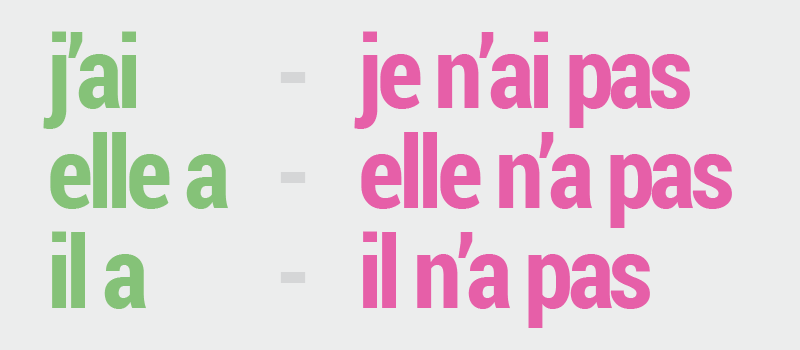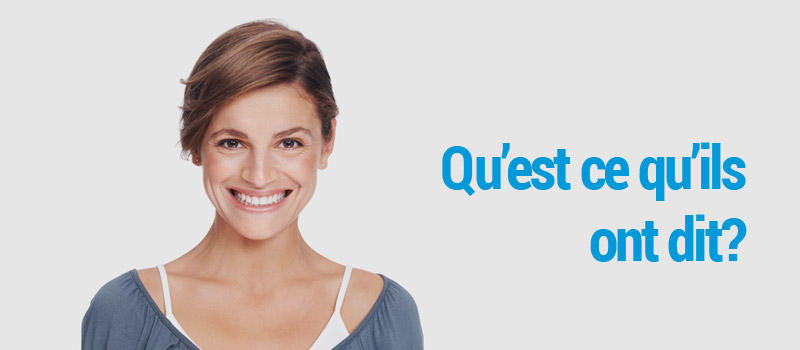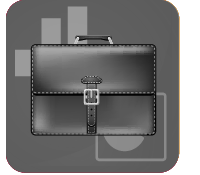The ten most common French verbs
Let's get started on French verbs with 5 of the most common.
être - To be

Let's start at the beginning:
- Je suis anglais
I'm English
But if you are a woman :
- Je suis anglaise
I'm English
That's right, French has feminine and masculine formas for a whole host of words which are simply unisex in English. They also have lots of different ways of saying where you are from:
- Il est américain
He is American - Elle est américaine
She is American
We can also use a different verb:
- Il vient des États-Unis
He comes from the United States - Elle vient des États-Unis
She comes from the United States
Or. even:
- il est originaire des États-Unis
- elle est originaire des États-Unis
Let's look at how French forms negatives:
- Je ne suis pas française
I'm not French - Il n'est pas Suisse
He's not Swiss - Elle n'est pas Suisse
She's not Swiss
avoir - Have

Let's hope you don't need to use this French phrase:
- J'ai tellement de problèmes
I have so many problems
A typical situation for many:
- Je n'ai pas d'argent
I don't have any money
And more examples:
- J'ai mal à la tête
I have a headache - J'ai un problème
I have a problem - Il a une très belle petite amie
He has a beautiful girlfriend - Elle a un petit ami
She has a boyfriend.
Now, in negative:
- Je n'ai pas mal à la tête
I don't have a headache - Je n'ai aucun problème
I don't have a problem - Elle n'a pas de petit ami
She doesn't have a boyfriend
Here's a reminder of how we form the negatives:

Remember that we don't always translate literally from one language to another. In the example below the two languages use different verbs:
- Ce n'est pas un problème pour moi.
I don't have a problem with that.
dire - Say

Think of how many times a day you tell a friend of colleague what somebody else has said.
- Elle dit des choses tellement absurdes!
She says such stupid things! - Ils disent des choses tellement étranges!
They say such strange things!
Some questions now:
- Qu'est ce qu'ils ont dit?
What did they say? - Qu'est ce que tu as dit?
What did you say? - Qui a dit cela / ça?
Who said that?
For the following questions, we have two different forms, both equally correct:
- Pourquoi as-tu dit cela?
Why did you say that? - Pourquoi tu as dit ça?
Why did you say that?
- Quand as-tu dit cela?
When did you say that? - Quand tu as dit ça?
When did you say that?
- À qui as-tu dit ça?
Who did you say that to?
- À qui tu as dit ça?
Who did you say that to?
For loads more useful French questions, take a look at this lesson.
aller - Go
Let's look first at a couple of questions:
- Où veux-tu aller?
Where do you want to go? - Quand veux-tu y aller?
When do you want to go?
And now the imperative:
- Allons-y!
Let's go! - Ne pars pas!
Don't go!
Some more examples:
- Allons manger quelque chose.
We are going to have something to eat. - Allons dans un bar.
We are going to a bar. - Elle va à l'université en autobus / en bus.
She goes to university by bus. - Il va travailler en train.
He goes to work by train.
Faire - Make / Do
Another extremely common French verb:
- Elle a fait beaucoup de bruit.
She made a lot of noise. - Fais l'amour et pas la guerre.
Make love not war.
Remember that the verb faire isn't used in as many situations as the English equivalent:
- Je n'ai pas commis d'erreur.
I didn't make a mistake. - J'ai préparé une tarte.
I'll make a cake. - Je n'ai pas fait de gâteau! / tarte.
I didn't make a cake! - Il prépare une tasse de thé?
Will he make a cup of tea? - Peux-tu me préparer une tasse de café?
Can you make me a cup of tea? - J'ai commis une erreur.
I made a mistake. - Il a commis beaucoup d´erreurs dans sa vie.
He's made a lot of mistakes in his life. - Je ne commets pas d'erreur.
I don't make mistakes.
pouvoir - Can
Let's start with a couple of very useful questions:
- Peut tu m'aider? / Tu peux m´aider?
Can you help me? - Je peux t'aider?
Can I help you?
Now on to phrases:
- Je peux le faire.
I can do it. - Je ne peux pas le faire.
I can't do it. - Je ne peux pas y croire.
I can't believe it! - Je ne peux pas le faire.
I can't do it. - Il ne peut pas parler français.
He can't speak French.
We could also form that last sentence with different verbs:
- Il ne parle pas anglais
He doesn't speak English. - il ne sait pas parler anglais.
He doesn't know how to speak English.
Thanks for visiting!
Some other stuff here
This Course
Basic French

Just getting started? Here are all the basics, from introducing yourself, to numbers, the alphabet and loads more crazy Gallic stuff.
Other sections in this course
Real French I

Forget the textbooks. Here's the sort of informal French you'll hear amongst friends.
It's the type of really practical language that you'll use all the time in casual conversations, but nobody's actually ever bothered to teach you. Until now.
1.2: Show me more!

You've learnt the basics (Tell me you've learnt the basics!) and want to move on? Let's look at likes and loves and a whole load of other stuff.
Basic French Grammar

Your starter's guide to French grammar rules.
1.1 Know nothing? Start here!

Bienvenue to our series of classes for anyone starting to learn French, or those of you who were smoking behind the bike sheds when they should have been in French class.
Our focus in these classes is on real, practical examples which you can start to use straight away. We'll keep grammar to a minimum, promise!
1.1 Know nothing? Start here!
Other classes in this section:
My First 20 French Phrases

Who says you have to start with boring grammar? Here are the first 20 French phrases you'll want to know if you are just starting to learn French.
My first 30 Questions in French

A great introduction to forming questions in French. From asking for directions, ordering in a restaurant, to finding out if that cute guy/girl is married or not. Here's out guide to the top 30 French questions for beginners.
The ten most common French verbs

Let's get started on French verbs with 5 of the most common. We've also included loads of examples phrases and questions.
Numbers in French

The French numbers up to 100, including all those crazy numbers from 70 to 99. Audio provided.
5 Things you really need to know about French

Talking about ourselves

nothing
